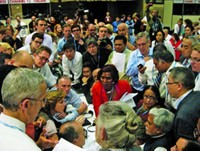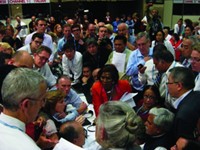Advertisement
Grab your lab coat. Let's get started
Welcome!
Welcome!
Create an account below to get 6 C&EN articles per month, receive newsletters and more - all free.
It seems this is your first time logging in online. Please enter the following information to continue.
As an ACS member you automatically get access to this site. All we need is few more details to create your reading experience.
Not you? Sign in with a different account.
Not you? Sign in with a different account.
ERROR 1
ERROR 1
ERROR 2
ERROR 2
ERROR 2
ERROR 2
ERROR 2
Password and Confirm password must match.
If you have an ACS member number, please enter it here so we can link this account to your membership. (optional)
ERROR 2
ACS values your privacy. By submitting your information, you are gaining access to C&EN and subscribing to our weekly newsletter. We use the information you provide to make your reading experience better, and we will never sell your data to third party members.
Environment
Bali Compromise
U.S. concessions allow agreement on continuing climate-change talks
by Bette Hileman
December 19, 2007
The climate-change agreement reached on Dec. 15 at the United Nations Climate Change Conference in Bali, Indonesia, represents a compromise between what the European Union hoped for and what the U.S. aimed for.
The 187 countries represented in Bali agreed to meet frequently during the next two years to negotiate an accord to replace the Kyoto protocol, which expires in 2012. This was a concession on the part of the U.S. because for years before the meeting it had opposed formal talks on a successor to the protocol. The U.S. is the only major developed country that has not ratified the treaty.
Another source of contention during the negotiations was the need for specific emissions targets. The EU wanted the agreement to set a target for developed countries of reducing greenhouse gas emissions 25–40% below 1990 levels by 2020. The U.S., Canada, and Japan opposed any concrete numerical targets. The final agreement reflects the U.S. position, but the 25–40% target is in a preamble footnote.
A third point of disagreement concerned the emissions commitments required of developing countries. Until the last few hours of talks, the U.S. insisted that developing countries make strong commitments to control their emissions growth. But in the face of acrimonious opposition—especially from Papua New Guinea delegate Kevin Conrad, who told the U.S., "Lead, follow, or get out of the way"–the U.S. finally backed down. The U.S. won one concession, however. The developing countries agreed to "consider" controlling emissions.
A high point was the Dec. 13 speech by former vice president Al Gore, who had received the Nobel Peace Prize in Oslo, Norway, three days earlier. "My own country, the U.S., is principally responsible for obstructing progress here in Bali, but the U.S. is not the only one who can take steps to ensure that we move forward from Bali with progress," he said to cheers from the audience. "You can feel anger and frustration and direct it at the U.S., or you can decide to do all of the difficult work that needs to be done. We must leave here with a strong mandate."
After the meeting, U.S. Senior Climate Negotiator Harlan L. Watson explained the U.S. position on numerical targets: "We didn't want a predetermined outcome for the upcoming talks on a successor to the Kyoto protocol." The U.S. agreed to take part in the Bali negotiations, he said, because the science has become more convincing and the political climate in the U.S. has shifted.
According to David Doniger, policy director of the climate center at the Natural Resources Defense Council, the Bali meeting opened the door "to negotiate binding obligations for both developed and developing countries." In Bali, he said, "China, Brazil, South Africa, and other big developing countries showed unprecedented willingness to start negotiating real actions to slow and reverse their own growing emissions."





Join the conversation
Contact the reporter
Submit a Letter to the Editor for publication
Engage with us on Twitter